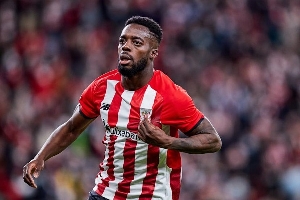- Home - News
- TWI News | TV
- Polls
- Year In Review
- News Archive
- Crime & Punishment
- Politics
- Regional
- Editorial
- Health
- Ghanaians Abroad
- Tabloid
- Africa
- Religion
- Election 2020
- Coronavirus
- News Videos | TV
- Photo Archives
- News Headlines
- Press Release
Opinions of Sunday, 20 July 2008
Columnist: Asubonteng, Bernard
Some Comments on Rawlings’ Speech on July 1, 2008
By Bernard Asubonteng, Atlanta, GA.
I’ve tried as much as I could to assign a dispassionate interpretations or readings in to Rawlings’ press conference or speech at his upscale Ridge residence in Accra on July 1, 2008 but didn’t succeed. Before reading the entire speech, I gave him the benefit of the doubt, thinking that the ex-president has matured as he ages and that his respectable position as Ghana’s only living former president would make him tread shrewdly without making any more unguarded utterances. I was wrong. An in-depth analysis of the speech erased any doubt on my mind that Rawlings is a walking contradiction, frustration, confusion, desperation and self-pity.
As usual, Rawlings’ speeches are empty of substance, full of threats, belligerent, fake exhibition of bravery, inaccuracies, buck-passing, holier-than-thou assumptions, incoherencies, including run-on sentences and phrases that border on generalities. This speech is no different from his numerously previous ones except that in this particular one he markedly exposed his intellectual and moral deficiencies through his skewed thought processes. It’s obvious from the speech that Rawlings wishes for Ghana to descend into political turmoil where his sympathizers in or outside the military can seize power, giving him another chance to behave as if he is repository of all knowledge and has Ghana as his bona fide property.
Rawlings parades a persona that seems to thrive on controversy and troublemaking. Indeed, he has become an intractable problem-child of the peace-loving Ghanaians. Whenever he rants, needless to say makes unsubstantiated claims, it appears he derives some sort of satisfaction and a sense of affirmation and relevance. In his speech he claimed that Ghana under the NPP government is witnessing serious human rights abuses similar to those happening in dictator Mugabe’s Zimbabwe. Furthermore, he suggested that Ghanaians’ voices have been silenced by the current administration, making many people disenchanted concerning the democratic process taking place in the country. Not only are these claims false, but it also speak a lot about how far Rawlings’ will go to bend the truth to suit his cynical motives. It really is an unbelievable that many Ghanaians still allow themselves to be fooled by this revolutionary apostate via his mediocre and “common-man” lecture-speeches. Rawlings can run as far away as he wants from himself, but he cannot hide the fact that he and his immediate family belong to the elite class. The man is very rich; most of his children get their education in the Western countries, the societies he seems to despise. Through his never-ending speeches over the years, he has reinforced the notion that he lacks a deep understanding of the dynamics of geopolitical issues, including what constitutes human rights abuses. Let’s even ignore the chilling fact that under Rawlings’ watch Ghana recorded an unprecedented surge in human rights abuses in the nation’s brief history since independence. Here comes a former president living comfortably in his mansion in one of the most affluent neighborhoods in Ghana, holding a press conference in his own home with no state police interference or intimidations, yet implying that the government has suppressed free speech, right to assembly, and the due process of the law. I do share the sentiments that democracy has its built-in fallacies and imperfections, but we also have to remember that with all its flaws, democratic system is a fortification against something far worse.
What Rawlings failed in his speech to tell the whole world was that unlike despot Mugabe’s Zimbabwe, no Ghanaian opposition leader (Rawlings included), for the past eight years, is forced to take refuge in a foreign embassy. Through deadly threats and savage intimidations, old pal Mugabe forced his main political rival Morgan Tsvangirai to take cover at the Dutch embassy. Again, under Mugabe about 25% of the population has migrated to the neighboring nations out of fear, according to the Associated Press reports in May. The same report stated that inflation in Zimbabwe has risen to 1,063,572% based on prices of a basket of basic foodstuffs such as corn. As of now, Zimbabwe is in shambles because of Mugabe’s despotic judgment over the decades. But the investment climate in Ghana is enticing; Business is flourishing steadily; and, people from far and nearby countries are flocking into Ghana to enjoy the relative peace and economic prosperity occurring under the present government. Ghana’s ruling NPP is far opposite of Zimbabwe’s ZANU-PF led by papa Mugabe. Currently in Ghana, her citizens can take the government to task without political retributions. The Ghanaian press is vibrant more than ever before; and, the opposition parties are numerous and vociferous. It’s a healthy development for the country’s young democracy for the people to offer well-informed criticisms of the government. The general belief is that the government understands that for a democracy to endure, strong opposition and free press are needed. That is why Rawlings can vent his lungs out at the government whenever he chooses to. There is nothing wrong for an ex-president to engage in an intellectual discussions pertaining to the socio-economic direction of his or her country. However, such a discourse must be substantive devoid of cheap shots and angry outbursts, especially when it’s coming from a person of his high political background.
In any event, if Rawlings still truly believes Ghana is under political suppression like Zimbabwe, how about he naturalizes as a Zimbabwean just for one week and starts talking over his head with Mugabe as president the way he has been “Dr. Booming” in Ghana then after that perhaps Rawlings would come to understand the full cycle of human rights abuses.
Another assertion that needs scrutiny is Rawlings’ argument that “A society or nation that has a commensurate police size is a reflection of not only the high level of social sense of responsibility of its people, but also of high moral level of government, agents and instrument of justice.” Wow! What exactly does Rawlings mean? What is he afraid of that pushes him to take on a fight against increasing the size of Ghana’s police force? By “commensurate police size” is he setting a limit or a specific number of police Ghana can have? What meets Rawlings’ criteria regarding “sizable” police force? Sounds like Mr. Rawlings wants to have it both ways. On one hand, he is crying foul that the rate of crime under the present government is soaring uncontrollably. And on the other hand, he thinks increasing the number of police in Ghana is not necessary because the societal sense of morality and responsibility will fill the police void. Thus, Rawlings’ argument assumes that people, by nature, are socially responsible, watchful and highly moral. So, more policing may render them irresponsible, apathetic, and more so lose their sense of morals as citizens. This is purely abstract rigmaroles, and it runs counter to realities in every contemporary community which is seriously trying to control the increasing crimes.
The importance of large, efficient, and corrupt-free police force in fighting crimes in modern societies hardly needs emphasis. This explains why developed nations like the U.S., Britain, Germany, and France, rely heavily on large and highly efficient police to enforce the law. Many people who have lived or still live in some of these cited countries may be familiar with how widespread the police are. For example, police cars patrol nearly everywhere in American streets and neighborhoods 24/7. Does that make the U.S. a police state or do a large number of the Scotland Yard police make the U.K. a police state? Besides, a country can have a small number of police force and still be a “Police State,” depending on the extent to which the government in power uses them—either as an instrument of political intimidations, assassinations, or solely as law enforcement or for a legitimate internal security purposes. Ghana needs more well-equipped, competent and corrupt-free police in her streets and highways! Whoever wins in the November elections should make that a top priority.
Personally, I find it difficult to understand why any rational person would exploit a sad situation for political points. The conflict between Kokombas and Nanumbas is an unfortunate tragedy which every God-fearing person wishes and prays that a long-lasting solution becomes a reality. Instead, Rawlings is going from forum to forum peddling false claims that the NPP is behind and inflaming the sad conflict to its advantage. What advantage? How did Rawlings reach that preposterous conclusion? Well, according to him the NPP caused the killing of Ya-Na Andani to prevent public resistance over The NPP’s election fraud in 2000. Again in 2004 elections, Rawlings alleged that the government repeated the same sinister game plan by masterminding the death of Mr. Molbila to cover up voting fraud. This salacious accusation is not only coming from a desperate mindset, but it’s also grotesque in its urban familiarity. The genesis of the on and off dispute between Kokomba-Nanumba, though regrettable, goes far beyond the influence of any Ghanaian political party or a leader. If Mr. Rawlings thinks he knows the root cause(s) and has all the solutions to the depressing crisis in the north, what is he waiting for all these years?
This brings me to my final point. Mr. JJ Rawlings in a self-pity posture complained in his speech that “I would have wished that the party [NDC] has learnt some lessons from me but not a single one piece of my advice has been taken by the party since I left office as president.” To me the answer is not hard to find. The NDC as a party has come a long way for one person to call the shots all the time. Plus, the new crop of leadership of the party, I think, is smart and well-educated and has more engaging and inclusive ideas than what Rawlings has to offer. The NDC has come to realize that it takes more than one person to win an election. Maybe Rawlings needs a serious self-introspection so he would come to understand that Ghanaians of 1979 is quite different from today. The country is more sophisticated politically than ever before. Playing one tribe against another doesn’t win elections anymore. We’re all Ghanaians first no matter what we think of ourselves. If it’s true that the NDC leadership is ignoring Rawlings’ advice as he lamented, then the party is doing itself a great service. It needs to distance itself from its founder’s bellicose and incendiary speeches. It has no place in civil political discourse. Rawlings as an ex-president should know better!











